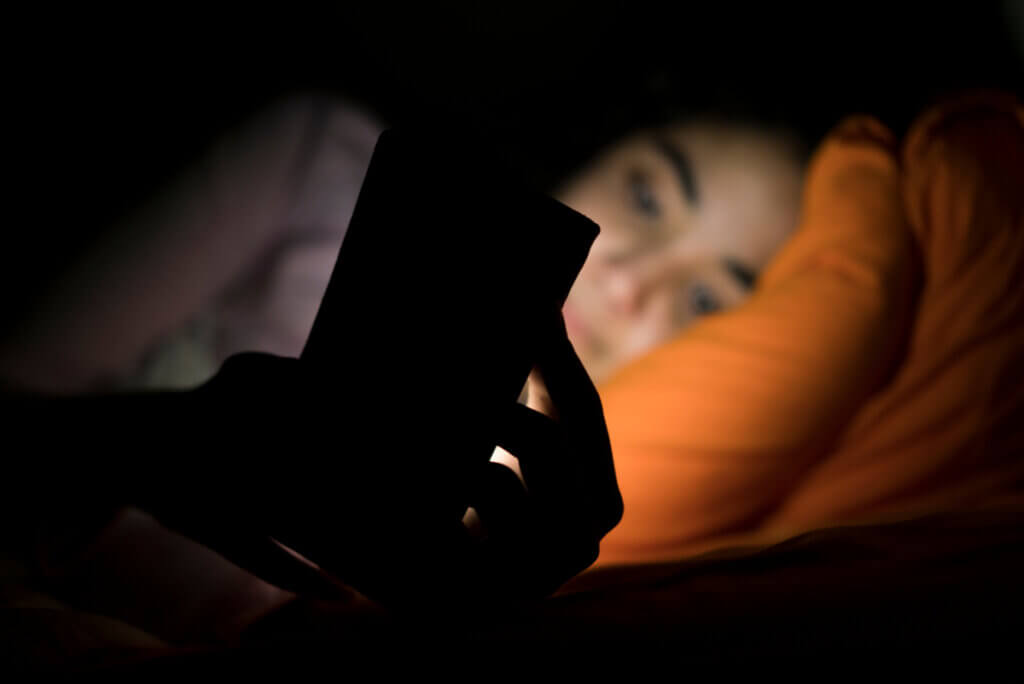What to Do if I Stay Awake at Night?

What to do if I stay awake at night? This is the question that many people who suffer from chronic or temporary insomnia ask themselves. Insomnia is a sleep disorder characterized by difficulty getting adequate rest.
Depending on the time of night when the interference occurs, insomnia can be of three types: Conciliation (difficulty falling asleep when we go to bed), maintenance (waking up continuously during the night), and early awakening (waking up very early and not getting back to sleep).
Whether it’s something specific or a chronic problem, the truth is that staying up late at night can interfere with people’s lives, causing daytime sleepiness, accumulated fatigue, and other discomforts or alterations. So what can you do if you stay awake at night? We’ll leave you some suggestions.
What to do if I stay awake at night?
A good night’s sleep is essential in order to enjoy a good quality of life. Poor sleep for just one night affects happiness just like a deadline to turn in a paper does. In addition, the impact of not having slept well on the mood is higher.
On the other hand, sleeping well helps to retain information in the long term. These are just some examples of the advantages and disadvantages of not resting so that we understand the importance and usefulness of applying a series of measures when we stay awake at night.

Avoid picking up your cell phone
This is the most common temptation when we stay awake at night because we think about distracting ourselves. However, the truth is that it’s not recommended at all to do so. Why? The blue light that radiates from your screen acts on the body and will wake you up even more.
In addition, carrying out an activity that requires a certain cognitive effort will increase the level of alertness and activation, making it difficult for us to go back to sleep. In line with the above, also avoid turning on the TV. If you feel like you need to do something, choose something calming that requires little cognitive effort.
Stop looking at the clock
When we’re having a hard time falling asleep, we often ask ourselves “what time is it?” and then look at the clock. This is an automatic thought and action that we’ve all been guilty of from time to time. We tend to worry about how many hours of sleep we have left and start to count down.
It’s normal for this to happen to us, but we must avoid looking at the clock, continuously calculating how much time is left until the alarm goes off. By doing so, our worry increases, and that feeds the lack of sleep.
That is, the situation becomes a vicious circle that would be something like this: “I can’t sleep… I’ll try to sleep, but I won’t succeed… I only have a few hours of sleep left… I can’t sleep… “ Therefore, try to relax by leaving your mind blank (not an easy task, but one that can be learned).
Focus on your breathing
When you stay up late at night, try to practice the following: Close your eyes and focus on your breathing. Put your hand on your abdomen and feel how it swells as you slowly inhale air; then, feel how it deflates as you exhale the air progressively.
This little practice will make you feel more relaxed, which can make it easier to fall asleep. We’re talking about diaphragmatic breathing. According to UNC Health Care, it consists of relaxing breathing that uses the diaphragm, and, among its benefits, we find the following:
- Reduces pain
- Minimize muscle tension
- Helps control heart rate
- Reduces stress and anxiety
Put visualization into practice
Positive visualization is another relaxing technique that will allow us to reduce the levels of anguish or anxiety related to not being able to fall asleep. It’s about closing your eyes and imagining some pleasant image or scenario that provides you with a sense of calm, tranquility, or well-being.
When we start to put this technique into practice, it’s likely that we find it difficult to concentrate, that we don’t visualize in great detail, or that the images are unrealistic. However, with practice, we can develop realistic images, full of details, and in less and less time.
If we apply it while we do conscious or diaphragmatic breathing, the chances of relaxing will increase. Therefore, it’ll be easier for us to go back to sleep. Finally, you can also try meditation or mindfulness!
“A calm mind brings inner strength and self-confidence, which is why it’s very important for good health.”
-Dalai Lama-
Avoid tossing and turning
“I stay awake at night and start tossing and turning.” This is a common situation. However, it’s something that we must avoid. Why? Because if we get into the habit of doing it, even without realizing it and without any intention, the body will end up associating that time of night with wakefulness.
So, when you stay up late at night, try doing one of the above exercises, and if you find that it doesn’t work after 15 or 20 minutes, take a short walk around the house or go to another room. It’s a matter of the body disassociating the environment of the bed with wakefulness and only associating it with sleeping.
Check your mattress
Many times, we make the mistake of not changing the mattress for many years or of using one that doesn’t fit our bodies. This can affect the quality of sleep. The average useful life of this element depends on several factors, such as the use we give it, the frequency of cleaning, its type, and its support.
However, a mattress has a useful life of between 8 and 10 years on average. Just the same, your height and weight will also determine the correct wear time.
Therefore, depending on your body mass, the mattress should be more or less soft. In short, having a quality mattress that fits your body will facilitate a deeper rest and reduce the probability that you’ll stay awake at night.

Sleep medicine if you stay awake at night
We’ve talked about some ideas to put into practice in case you have a hard time sleeping at night, although there are many more. In addition, we recommend going to a sleep specialist in case this problem is having a significant impact on your day to day life.
As always, there are general guidelines to treat certain problems that can help us in mild cases, but the review of each specific case and personalized treatment will always be optimal options. Sleep medicine has advanced in recent times and we already have specialized clinics for these disorders.
Some guidelines for a good night’s sleep are the following: Respect sleep schedules, eat dinner between 2 and 3 hours before going to bed, use a comfortable bed in a quiet environment, control the temperature in the room, and avoid substances such as tobacco or alcohol.
What to do if I stay awake at night? This is the question that many people who suffer from chronic or temporary insomnia ask themselves. Insomnia is a sleep disorder characterized by difficulty getting adequate rest.
Depending on the time of night when the interference occurs, insomnia can be of three types: Conciliation (difficulty falling asleep when we go to bed), maintenance (waking up continuously during the night), and early awakening (waking up very early and not getting back to sleep).
Whether it’s something specific or a chronic problem, the truth is that staying up late at night can interfere with people’s lives, causing daytime sleepiness, accumulated fatigue, and other discomforts or alterations. So what can you do if you stay awake at night? We’ll leave you some suggestions.
What to do if I stay awake at night?
A good night’s sleep is essential in order to enjoy a good quality of life. Poor sleep for just one night affects happiness just like a deadline to turn in a paper does. In addition, the impact of not having slept well on the mood is higher.
On the other hand, sleeping well helps to retain information in the long term. These are just some examples of the advantages and disadvantages of not resting so that we understand the importance and usefulness of applying a series of measures when we stay awake at night.

Avoid picking up your cell phone
This is the most common temptation when we stay awake at night because we think about distracting ourselves. However, the truth is that it’s not recommended at all to do so. Why? The blue light that radiates from your screen acts on the body and will wake you up even more.
In addition, carrying out an activity that requires a certain cognitive effort will increase the level of alertness and activation, making it difficult for us to go back to sleep. In line with the above, also avoid turning on the TV. If you feel like you need to do something, choose something calming that requires little cognitive effort.
Stop looking at the clock
When we’re having a hard time falling asleep, we often ask ourselves “what time is it?” and then look at the clock. This is an automatic thought and action that we’ve all been guilty of from time to time. We tend to worry about how many hours of sleep we have left and start to count down.
It’s normal for this to happen to us, but we must avoid looking at the clock, continuously calculating how much time is left until the alarm goes off. By doing so, our worry increases, and that feeds the lack of sleep.
That is, the situation becomes a vicious circle that would be something like this: “I can’t sleep… I’ll try to sleep, but I won’t succeed… I only have a few hours of sleep left… I can’t sleep… “ Therefore, try to relax by leaving your mind blank (not an easy task, but one that can be learned).
Focus on your breathing
When you stay up late at night, try to practice the following: Close your eyes and focus on your breathing. Put your hand on your abdomen and feel how it swells as you slowly inhale air; then, feel how it deflates as you exhale the air progressively.
This little practice will make you feel more relaxed, which can make it easier to fall asleep. We’re talking about diaphragmatic breathing. According to UNC Health Care, it consists of relaxing breathing that uses the diaphragm, and, among its benefits, we find the following:
- Reduces pain
- Minimize muscle tension
- Helps control heart rate
- Reduces stress and anxiety
Put visualization into practice
Positive visualization is another relaxing technique that will allow us to reduce the levels of anguish or anxiety related to not being able to fall asleep. It’s about closing your eyes and imagining some pleasant image or scenario that provides you with a sense of calm, tranquility, or well-being.
When we start to put this technique into practice, it’s likely that we find it difficult to concentrate, that we don’t visualize in great detail, or that the images are unrealistic. However, with practice, we can develop realistic images, full of details, and in less and less time.
If we apply it while we do conscious or diaphragmatic breathing, the chances of relaxing will increase. Therefore, it’ll be easier for us to go back to sleep. Finally, you can also try meditation or mindfulness!
“A calm mind brings inner strength and self-confidence, which is why it’s very important for good health.”
-Dalai Lama-
Avoid tossing and turning
“I stay awake at night and start tossing and turning.” This is a common situation. However, it’s something that we must avoid. Why? Because if we get into the habit of doing it, even without realizing it and without any intention, the body will end up associating that time of night with wakefulness.
So, when you stay up late at night, try doing one of the above exercises, and if you find that it doesn’t work after 15 or 20 minutes, take a short walk around the house or go to another room. It’s a matter of the body disassociating the environment of the bed with wakefulness and only associating it with sleeping.
Check your mattress
Many times, we make the mistake of not changing the mattress for many years or of using one that doesn’t fit our bodies. This can affect the quality of sleep. The average useful life of this element depends on several factors, such as the use we give it, the frequency of cleaning, its type, and its support.
However, a mattress has a useful life of between 8 and 10 years on average. Just the same, your height and weight will also determine the correct wear time.
Therefore, depending on your body mass, the mattress should be more or less soft. In short, having a quality mattress that fits your body will facilitate a deeper rest and reduce the probability that you’ll stay awake at night.

Sleep medicine if you stay awake at night
We’ve talked about some ideas to put into practice in case you have a hard time sleeping at night, although there are many more. In addition, we recommend going to a sleep specialist in case this problem is having a significant impact on your day to day life.
As always, there are general guidelines to treat certain problems that can help us in mild cases, but the review of each specific case and personalized treatment will always be optimal options. Sleep medicine has advanced in recent times and we already have specialized clinics for these disorders.
Some guidelines for a good night’s sleep are the following: Respect sleep schedules, eat dinner between 2 and 3 hours before going to bed, use a comfortable bed in a quiet environment, control the temperature in the room, and avoid substances such as tobacco or alcohol.
- American Academy of Sleep Medicine. (2005). The International Classifi cation of Sleep Disorders, Diagnostic and coding manual. 2nd ed.
- David, Perla, et al. “Medicina del sueño.” Chile: Editorial mediterráneo (2008).
- Millán Arroyo, Coral. “Efectos de la luz azul en el ritmo circadiano del sueño.” (2017).
- Mendelson WB, Roth T, Cassella J, Rohers T et al. (2004). The treatment of chronic insomnia: drug indications, chronic use and abuse liability. Summary of a 2001 new clinical drug evaluation unit meeting symposium. Sleep Medicine Reviews, 8: 7-17.
- Pérez, M., Fernández, J.R., Fernández, C. y Amigo, I. (2010). Guía de tratamientos psicológicos eficaces I y II:. Madrid: Pirámide.
- Lasso Peñafiel, Jorge. “Introducción a la medicina del sueño.” Cienc. Trab (2004): 53-58.
Este texto se ofrece únicamente con propósitos informativos y no reemplaza la consulta con un profesional. Ante dudas, consulta a tu especialista.







